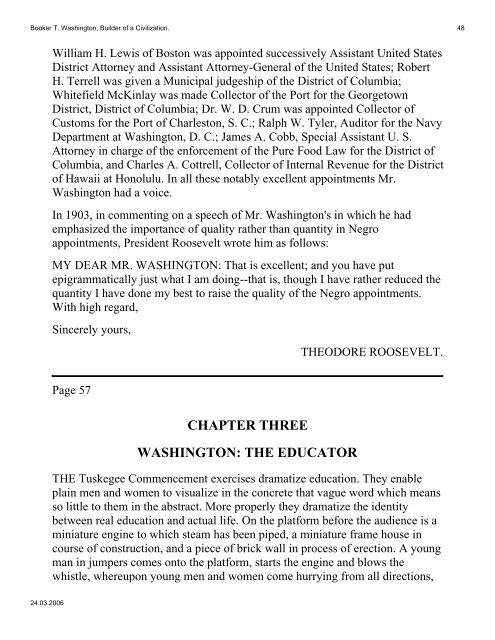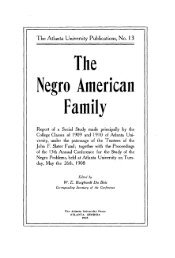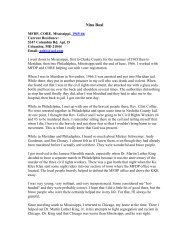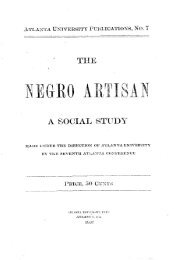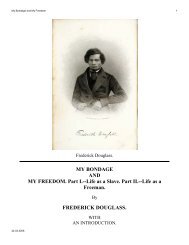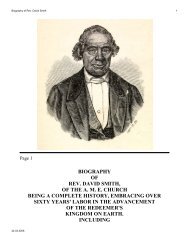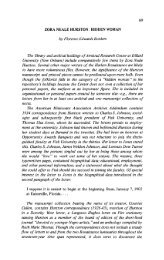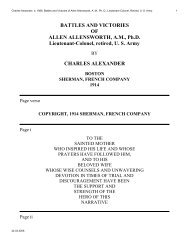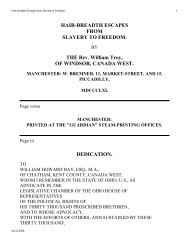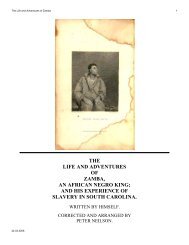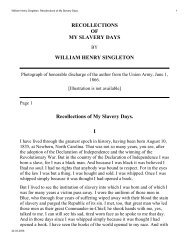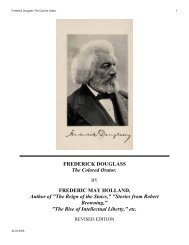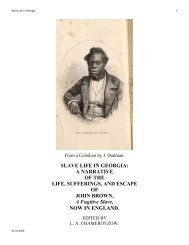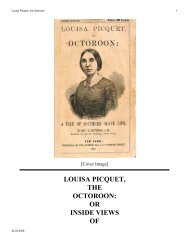- Page 1 and 2: Booker T. Washington, Builder of a
- Page 3 and 4: Booker T. Washington, Builder of a
- Page 5 and 6: Booker T. Washington, Builder of a
- Page 7 and 8: Booker T. Washington, Builder of a
- Page 9 and 10: Booker T. Washington, Builder of a
- Page 11 and 12: Booker T. Washington, Builder of a
- Page 13 and 14: Booker T. Washington, Builder of a
- Page 15 and 16: Booker T. Washington, Builder of a
- Page 17 and 18: Booker T. Washington, Builder of a
- Page 19 and 20: Booker T. Washington, Builder of a
- Page 21 and 22: Booker T. Washington, Builder of a
- Page 23 and 24: Booker T. Washington, Builder of a
- Page 25 and 26: Booker T. Washington, Builder of a
- Page 27 and 28: Booker T. Washington, Builder of a
- Page 29 and 30: Booker T. Washington, Builder of a
- Page 31 and 32: Booker T. Washington, Builder of a
- Page 33 and 34: Booker T. Washington, Builder of a
- Page 35 and 36: Booker T. Washington, Builder of a
- Page 37 and 38: Booker T. Washington, Builder of a
- Page 39 and 40: Booker T. Washington, Builder of a
- Page 41 and 42: Booker T. Washington, Builder of a
- Page 43 and 44: Booker T. Washington, Builder of a
- Page 45 and 46: Booker T. Washington, Builder of a
- Page 47: Booker T. Washington, Builder of a
- Page 51 and 52: Booker T. Washington, Builder of a
- Page 53 and 54: Booker T. Washington, Builder of a
- Page 55 and 56: Booker T. Washington, Builder of a
- Page 57 and 58: Booker T. Washington, Builder of a
- Page 59 and 60: Booker T. Washington, Builder of a
- Page 61 and 62: Booker T. Washington, Builder of a
- Page 63 and 64: Booker T. Washington, Builder of a
- Page 65 and 66: Booker T. Washington, Builder of a
- Page 67 and 68: Booker T. Washington, Builder of a
- Page 69 and 70: Booker T. Washington, Builder of a
- Page 71 and 72: Booker T. Washington, Builder of a
- Page 73 and 74: Booker T. Washington, Builder of a
- Page 75 and 76: Booker T. Washington, Builder of a
- Page 77 and 78: Booker T. Washington, Builder of a
- Page 79 and 80: Booker T. Washington, Builder of a
- Page 81 and 82: Booker T. Washington, Builder of a
- Page 83 and 84: Booker T. Washington, Builder of a
- Page 85 and 86: Booker T. Washington, Builder of a
- Page 87 and 88: Booker T. Washington, Builder of a
- Page 89 and 90: Booker T. Washington, Builder of a
- Page 91 and 92: Booker T. Washington, Builder of a
- Page 93 and 94: Booker T. Washington, Builder of a
- Page 95 and 96: Booker T. Washington, Builder of a
- Page 97 and 98: Booker T. Washington, Builder of a
- Page 99 and 100:
Booker T. Washington, Builder of a
- Page 101 and 102:
Booker T. Washington, Builder of a
- Page 103 and 104:
Booker T. Washington, Builder of a
- Page 105 and 106:
Booker T. Washington, Builder of a
- Page 107 and 108:
Booker T. Washington, Builder of a
- Page 109 and 110:
Booker T. Washington, Builder of a
- Page 111 and 112:
Booker T. Washington, Builder of a
- Page 113 and 114:
Booker T. Washington, Builder of a
- Page 115 and 116:
Booker T. Washington, Builder of a
- Page 117 and 118:
Booker T. Washington, Builder of a
- Page 119 and 120:
Booker T. Washington, Builder of a
- Page 121 and 122:
Booker T. Washington, Builder of a
- Page 123 and 124:
Booker T. Washington, Builder of a
- Page 125 and 126:
Booker T. Washington, Builder of a
- Page 127 and 128:
Booker T. Washington, Builder of a
- Page 129 and 130:
Booker T. Washington, Builder of a
- Page 131 and 132:
Booker T. Washington, Builder of a
- Page 133 and 134:
Booker T. Washington, Builder of a
- Page 135 and 136:
Booker T. Washington, Builder of a
- Page 137 and 138:
Booker T. Washington, Builder of a
- Page 139 and 140:
Booker T. Washington, Builder of a
- Page 141 and 142:
Booker T. Washington, Builder of a
- Page 143 and 144:
Booker T. Washington, Builder of a
- Page 145 and 146:
Booker T. Washington, Builder of a
- Page 147 and 148:
Booker T. Washington, Builder of a
- Page 149 and 150:
Booker T. Washington, Builder of a
- Page 151 and 152:
Booker T. Washington, Builder of a
- Page 153 and 154:
Booker T. Washington, Builder of a
- Page 155 and 156:
Booker T. Washington, Builder of a
- Page 157 and 158:
Booker T. Washington, Builder of a
- Page 159 and 160:
Booker T. Washington, Builder of a
- Page 161 and 162:
Booker T. Washington, Builder of a
- Page 163 and 164:
Booker T. Washington, Builder of a
- Page 165 and 166:
Booker T. Washington, Builder of a
- Page 167 and 168:
Booker T. Washington, Builder of a
- Page 169 and 170:
Booker T. Washington, Builder of a
- Page 171 and 172:
Booker T. Washington, Builder of a
- Page 173 and 174:
Booker T. Washington, Builder of a
- Page 175 and 176:
Booker T. Washington, Builder of a
- Page 177 and 178:
Booker T. Washington, Builder of a
- Page 179 and 180:
Booker T. Washington, Builder of a
- Page 181 and 182:
Booker T. Washington, Builder of a
- Page 183 and 184:
Booker T. Washington, Builder of a
- Page 185 and 186:
Booker T. Washington, Builder of a
- Page 187 and 188:
Booker T. Washington, Builder of a
- Page 189 and 190:
Booker T. Washington, Builder of a
- Page 191 and 192:
Booker T. Washington, Builder of a
- Page 193 and 194:
Booker T. Washington, Builder of a
- Page 195 and 196:
Booker T. Washington, Builder of a
- Page 197 and 198:
Booker T. Washington, Builder of a
- Page 199 and 200:
Booker T. Washington, Builder of a
- Page 201 and 202:
Booker T. Washington, Builder of a
- Page 203 and 204:
Booker T. Washington, Builder of a
- Page 205 and 206:
Booker T. Washington, Builder of a
- Page 207 and 208:
Booker T. Washington, Builder of a
- Page 209 and 210:
Booker T. Washington, Builder of a
- Page 211 and 212:
Booker T. Washington, Builder of a
- Page 213 and 214:
Booker T. Washington, Builder of a
- Page 215 and 216:
Booker T. Washington, Builder of a
- Page 217 and 218:
Booker T. Washington, Builder of a
- Page 219 and 220:
Booker T. Washington, Builder of a
- Page 221 and 222:
Booker T. Washington, Builder of a
- Page 223 and 224:
Booker T. Washington, Builder of a
- Page 225 and 226:
Booker T. Washington, Builder of a
- Page 227 and 228:
Booker T. Washington, Builder of a
- Page 229 and 230:
Booker T. Washington, Builder of a
- Page 231 and 232:
Booker T. Washington, Builder of a
- Page 233 and 234:
Booker T. Washington, Builder of a
- Page 235 and 236:
Booker T. Washington, Builder of a
- Page 237 and 238:
Booker T. Washington, Builder of a
- Page 239 and 240:
Booker T. Washington, Builder of a


